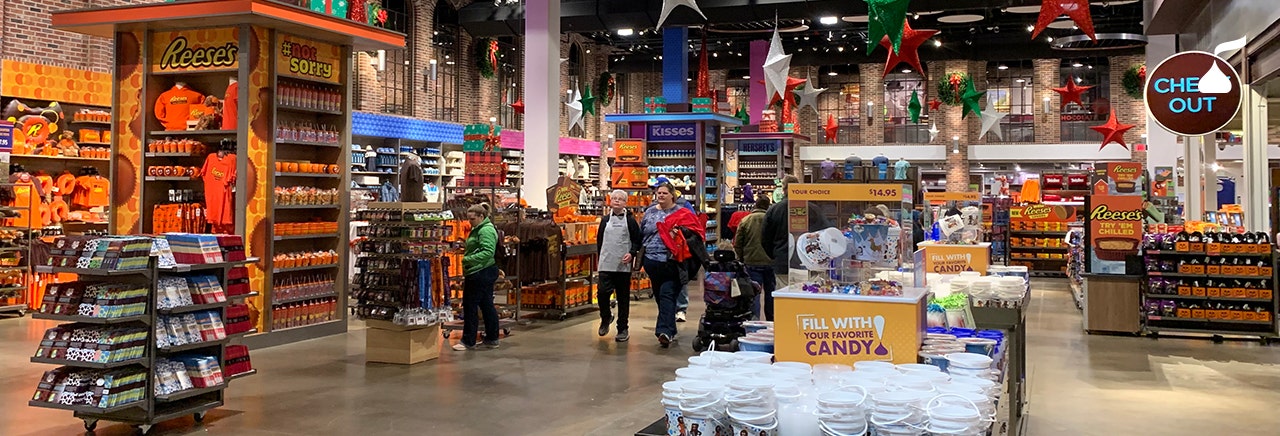Retail Takeaways: 4 Considerations for Brands
- Hershey celebrated its 125th anniversary this year, which prompted the company to search within and envision the next 125 years.
- At Groceryshop, industry insiders shared ideas on concepts businesses should consider as we move into the future.
- Technology, purpose and experience will continue to be important themes.
Earlier this year, I had the pleasure of attending Groceryshop, a four-day event in Las Vegas centered around disruptive trends, technologies and business models in the grocery and consumer packaged goods industries. There, business leaders and industry insiders shared creative ideas that retailers and brands should consider as we look towards the future. Throughout the sessions, I was struck by how many ideas are applicable to the entire retail environment, whether you're a niche retailer or a 125-year-old manufacturer. Here are four ideas that resonated with me when I look toward the future.
1. Every company is a tech company
I heard experts say this time and again. No longer is your brand just your brand. Businesses are also tasked with utilizing technology that helps consumers. With that comes responsibility: businesses must also protect consumer data. Jola Burnett, who is vice president of market research firm Growth from Knowledge (GfK), said that is a growing concern for consumers in the United States and across the globe. “It is estimated that one cyberattack occurs every 39 seconds. So part of that loyalty is protecting your customer data,” said Burnett. Krystina Gustafson, vice president of content with Groceryshop, also stated the importance of technology in business today and tomorrow. “Running a retail organization will increasingly be running a technology company. That’s going to impact everything from the types of employees you hire to how you approve orders,” she said. Gustafson pointed out that the job of the software developer is one of the fastest growing jobs in retail. Leaders will need to continue to find creative ways to recruit for this position.
2. Purpose matters
Today’s customers don’t just care about what businesses say. They care about what they do. “Brands must now identify who they are and what they stand for,” said Zia Daniell Wigder, co-founder and chief content officer with Groceryshop. “It’s no longer ok to be passive on important issues to consumers. Shoppers are looking for leadership from the companies they buy from and rewarding those who take a stand.”
This was a point that really resonated for me, because The Hershey Company has been a purpose-driven company since its earliest days, when our founder, Milton Hershey, sought to make chocolate affordable to everyone—not just wealthy people—to make more moments of goodness in people’s lives. Not only did he build houses, schools and entertainment for his employees, but he also founded the Milton Hershey School in 1909 to educate orphan boys.
In consumers’ eyes, purpose is as important as ever. A recent study found that brands recognized for their commitment to purpose have grown at twice the rate of other brands. Gustafson said she expects this to continue as a priority as Gen Z grows older. However, she cautions, brands need to be careful to not just give lip service to a cause. “Younger shoppers are also quick to call out companies who view purpose as a PR campaign,” she said. “It sounds simple, but brands need to select issues that align with their company mission and then actually deliver on the promises they’re making.”
3. Experiences resonate
You’ve heard it before: consumers are looking for experiences. This, too, struck a chord with me, because I’ve spent my career exploring the ways that the retail experience can impress or frustrate shoppers. I was delighted to hear this topic come up time and again at the conference. “We know consumer experience is still No.1 when it comes to building trust. How can you push yourself to the next level?” asked Burnett, with GfK. “How can you be thoughtful in your actions to be ahead of the consumer? It’s really reimagining the role of the store.” She shared the example of Apple stores offering hand-on sessions in photography, video and music to their customers. She added that retailers have the opportunity to open their doors and become a town square, facilitating learning and acting as a community club. Loneliness has become an issue of concern in our world (that, too, came up multiple times at the conference) and retailers can work to fill that void, while still staying true to their brand.
4. Artificial intelligence (AI) is incredibly relevant
AI and machine learning can help consumers discover products by making informed recommendations tailored to their interests and to the interests of their families. Joe Laszlo, vice president of content with Groceryshop, said that AI can help brands become more customer-centric by selling them the products that are best for them. “Done right, AI can inspire more serendipity at the grocery store, helping retailers and brands select, stock and suggest products that will delight shoppers,” said Laszlo. “AI-based systems are way better than humans at inferring patterns across a wide variety of data. That can include purchases, searches, location data, social media trends; it can take all of this data and turn it into meaningful insights-based recommendations. These capabilities will help keep shoppers coming back to discover new things.”
We’re living in an exciting time. Technology is evolving at an incredible pace, and a lot of what we’re seeing today—like AI—once seemed like science fiction. At Groceryshop, brands, retail partners and others got the opportunity to put our heads together and imagine the possibilities that lie ahead. I, for one, can’t wait to see what that future holds, for Hershey and for all of us.
